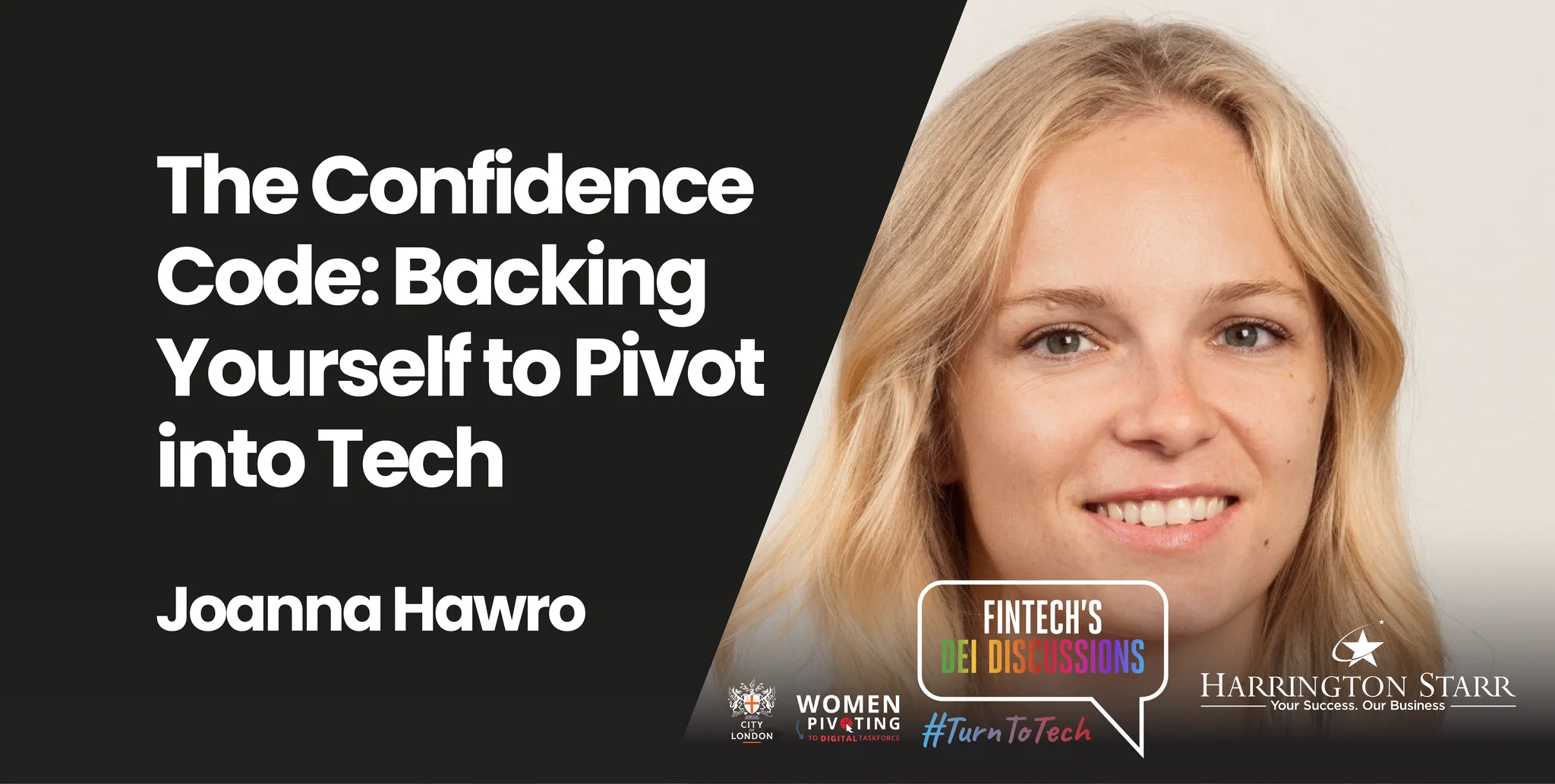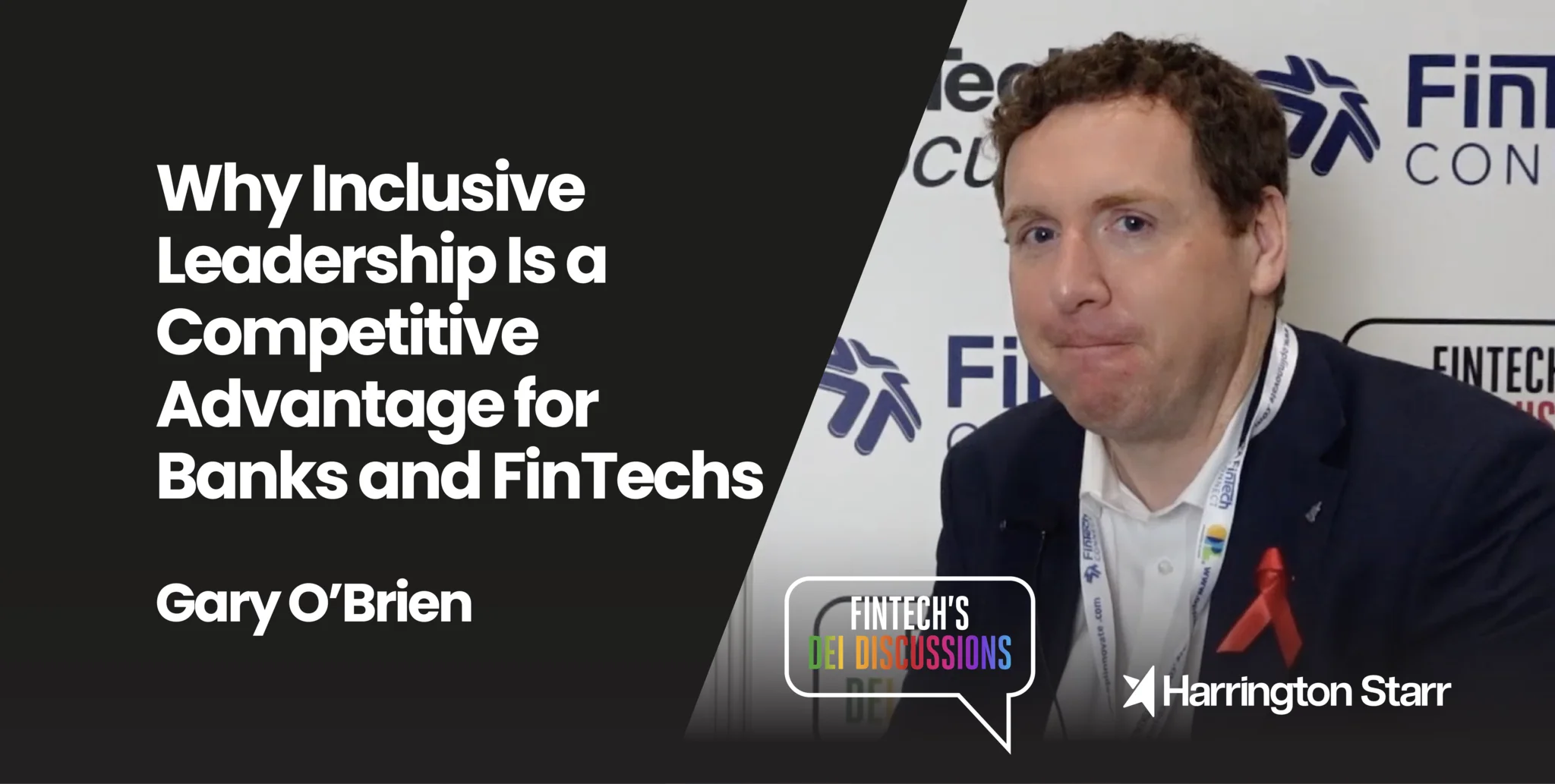The Confidence Code: Backing Yourself to Pivot into
In this Turn to Tech special of FinTech’s DEI Discussions, Nadia sits down with Joanna Hawro, SaaS Implementation Team Manager at Kantox by BNP Paribas, for an in-depth and empowering conversation about what it truly takes to change career paths, build confidence, and establish a thriving future in technology.
This episode, titled “The Confidence Code: Backing Yourself to Pivot into Tech”, is part of a 12-part mini-series powered by FinTech’s DEI Discussions, in partnership with the City of London Corporation and the Women Pivoting to Digital Taskforce. The series is designed to spotlight the stories of women who have transitioned from non-technical backgrounds into digital and technology-driven roles, demystifying the process and inspiring others to make the leap.
The initiative also serves a broader purpose, to address the underrepresentation of women in digital careers by providing practical insights, resources, and encouragement to those looking to take their first steps. It aligns closely with the mission of Harrington Starr, a FinTech recruitment business committed to promoting inclusion, confidence, and opportunity in financial technology workplaces around the world.
From Finance to FinTech: A Journey of Reinvention
Joanna’s professional journey began in the traditional and highly structured world of investment banking and hedge funds. Over the course of more than a decade, she built a successful career within that environment, taking on multiple roles that required precision, resilience, and adaptability. Her career path evolved from back-office operations to leadership positions that involved managing teams and running complex projects.
It was during this time that Joanna first began interacting with technology as part of her day-to-day work. She started with small changes, such as streamlining processes and minimising operational risk, often through the use of simple automation tools. These early experiences sparked an interest in the technical side of financial services. Over time, she began to play a key role in the implementation of new systems and the coordination of large-scale transformation projects.
Through these experiences, Joanna recognised that what she enjoyed most was not just the management of financial workflows, but the innovation that technology could bring to them. The pace, creativity, and potential for change in the tech world contrasted sharply with the rigidity of corporate finance. She saw an opportunity to bring together her knowledge of finance and her growing passion for technology, and to explore the emerging world of FinTech.
That realisation led her to make a bold decision: to step out of her comfort zone and join a FinTech scale-up. The move wasn’t just a professional shift; it was a complete transformation that involved moving to a new country, adapting to a new culture, and starting a new chapter in a rapidly evolving industry.
A Leap Across Industries and Borders
When Joanna joined Kantox, she was not only entering the technology sector but also leaving behind the familiar world of corporate finance. She describes this transition as a life-changing experience, encompassing professional, cultural, and personal reinvention.
Moving from Poland to Barcelona, she had to navigate an entirely new environment. The startup setting of Kantox contrasted greatly with the structured hierarchy of her previous roles in banking. She went from working in a global financial institution to joining a growing FinTech company where agility, creativity, and innovation were at the forefront.
At Kantox, Joanna began as an Implementation Manager for Global Markets, working with large corporate clients and complex operational structures. This role exposed her to a diverse range of technical and commercial challenges. It also allowed her to develop a deeper understanding of how financial technology solutions are built, implemented, and scaled.
Her position sits uniquely between the technical and business sides of the organisation. As a SaaS Implementation Manager, she deals with product integrations, APIs, and system configurations, while also managing client relationships and ensuring smooth delivery. This combination of technical understanding and commercial communication has been crucial to her success.
Through dedication and a willingness to learn, Joanna quickly progressed within the company. After several years, she was promoted to a leadership position where she now mentors and supports others as they develop their own technology careers. Her story demonstrates that thriving in FinTech doesn’t require a traditional technical background, it requires curiosity, resilience, and an openness to growth.
Facing Challenges and Building Confidence in FinTech
Transitioning into technology from another industry can feel daunting. For Joanna, one of the biggest challenges was learning how to position herself in a completely new environment. With over ten years of experience in finance, she had to find ways to demonstrate that her skills were relevant to a FinTech company.
She realised that, while she had participated in numerous technology projects, she lacked formal training in programming or software development. Rather than seeing this as a barrier, she viewed it as an opportunity to strengthen her foundations. To gain confidence and credibility, Joanna enrolled in a Python class at Stanford University, which equipped her with a deeper understanding of coding and the technical language used by engineers.
This step not only enhanced her technical skills but also gave her the confidence to communicate effectively with development teams. It helped bridge the gap between her financial expertise and the technical world she was entering.
Her transition was not without uncertainty. Moving from a large, established financial institution to a smaller, fast-paced startup meant adjusting to new expectations and ways of working. Joanna had to adapt to a culture that valued experimentation and flexibility, where roles evolved rapidly, and structure was often replaced by creative problem-solving.
She credits her perseverance and previous experience with helping her succeed through this period of change. The ability to remain calm under pressure, deliver on deadlines, and manage complex projects became invaluable. By reminding herself that she had navigated difficult situations before, she found strength to continue learning and growing in her new environment.
Debunking Misconceptions About Digital Careers
Throughout her career shift, Joanna encountered several misconceptions about what it means to work in technology. One of the most persistent was the idea that only people with coding backgrounds or computer science degrees could succeed in tech roles.
Her experience at Kantox proved otherwise. FinTech companies require a wide range of skills beyond software engineering, including compliance, operations, finance, legal, marketing, and customer success. Joanna’s financial expertise and experience in managing client relationships turned out to be significant assets within a tech-driven organisation.
Another misconception she challenges is the belief that switching industries means starting over from scratch. Joanna emphasises that previous experience, even from a different field, carries enormous value. The soft skills, strategic thinking, and business understanding developed in one environment can often be transferred to another.
This perspective is particularly relevant in FinTech recruitment, where employers increasingly value diverse backgrounds. The ability to view challenges from multiple perspectives is often what drives innovation. Joanna’s story illustrates that success in technology is not about discarding past experience but about reframing it to suit new contexts.
Practical Steps for Those Looking to Transition into Tech
One of the key takeaways from Joanna’s journey is her structured yet human approach to career change. She advises anyone considering a transition into FinTech or digital roles to begin with clarity of purpose. Understanding why you want to make a change creates a strong foundation for decision-making and motivation.
She believes that preparation is essential. Identifying gaps in your skillset and proactively addressing them can make the process less intimidating. For some, this might mean learning a coding language or taking a data analytics course. For others, it could involve improving communication, leadership, or problem-solving skills.
Joanna also highlights the importance of research and networking. Speaking to people already in the industry provides valuable insight into what the work entails and how to prepare for it. Platforms like LinkedIn make it easier than ever to reach out to professionals, ask questions, and build connections.
These conversations not only provide information but also build confidence. Hearing how others made similar transitions reinforces the belief that it can be done. Joanna credits much of her success to being proactive, taking the initiative to learn, connect, and adapt rather than waiting for opportunities to present themselves.
Her message is clear: those who prepare, stay curious, and back themselves are far more likely to succeed in FinTech.
Confidence as a Shared Responsibility
A central theme throughout the episode is confidence, not just as an individual quality but as a shared responsibility between professionals and the organisations that employ them.
On a personal level, Joanna stresses that women often underestimate their capabilities or hesitate to apply for roles unless they meet every requirement. She encourages women to advocate for themselves and to recognise that confidence grows through action.
However, she also believes that companies have a vital role to play in fostering confidence among their employees. True inclusion requires more than just opportunities; it requires belief in people’s potential. She argues that when leaders place trust in their teams and give them the space to prove themselves, individuals are more likely to thrive.
For businesses looking to support women entering technology, Joanna suggests simple yet impactful steps. Providing access to mentorship, training, and development programmes helps employees build both competence and confidence. Equally, offering promotions or challenging projects to those who might not yet see their own potential can transform careers.
This message resonates strongly with what we see across FinTech recruitment today. As companies compete for top talent, those that invest in building their employees’ confidence, through trust, mentorship, and opportunity, create workplaces that attract and retain exceptional people.
The Role of Continuous Learning and Community in FinTech Careers
For Joanna, the commitment to learning didn’t end once she landed her role in FinTech. She describes continuous education as a cornerstone of career success in the digital age. The pace of technological change means that professionals must keep developing new skills and staying curious.
Formal education, such as coding courses or certifications, is valuable. Yet Joanna also highlights the importance of informal learning, reading, attending workshops, and connecting with others who share similar interests.
Networking plays a crucial role here. Engaging with peers across industries broadens understanding and provides exposure to different perspectives. In major cities like London, Barcelona, and Paris, there are numerous professional communities and meet-ups dedicated to technology, finance, and digital innovation. Joanna sees these as vital spaces for sharing knowledge, meeting mentors, and building confidence.
Communities like these also reinforce the social side of professional development. They help individuals realise they’re not alone in their challenges, and they provide encouragement to keep going when obstacles arise.
Creating a Culture of Confidence and Inclusion in FinTech
The conversation between Nadia and Joanna closes with a reflection on the collective responsibility of fostering confidence in the workplace. Too often, confidence is seen as something individuals must develop on their own. Joanna challenges this idea, suggesting that workplaces can actively create environments that nurture it.
When companies empower employees to experiment, make mistakes, and grow without fear of failure, confidence naturally follows. Leaders who believe in their team members and provide them with genuine opportunities for growth send a powerful message about trust and inclusion.
For women in particular, this kind of environment can make the difference between hesitation and ambition. Joanna believes that when managers recognise potential and take deliberate steps to support it, they help dismantle the barriers that have traditionally kept women from entering or advancing in digital roles.
Her story is proof that with encouragement, preparation, and a strong sense of purpose, professionals from all backgrounds can succeed in FinTech.
A Lesson in Courage and Adaptability
At its heart, this episode of FinTech’s DEI Discussions is about the courage to reinvent oneself. Joanna’s path from investment banking in Poland to leading SaaS implementation at a FinTech firm in Spain is a powerful reminder that careers are rarely linear.
Her journey underscores the importance of adaptability, learning, and confidence in shaping modern careers. It also highlights the role that allies, mentors, and inclusive organisations play in enabling people to reach their full potential.
The Turn to Tech initiative, powered by FinTech’s DEI Discussions, the City of London Corporation, and the Women Pivoting to Digital Taskforce, continues to shine a light on stories like Joanna’s, stories that show how women across industries are reimagining their futures in digital and technology-driven roles.
Empowering the Next Generation of FinTech Talent
At Harrington Starr, we see every day how the intersection of finance and technology creates opportunities for professionals to thrive. Joanna’s experience illustrates what is possible when individuals combine their existing strengths with a willingness to learn and grow.
Her insights into confidence, learning, and community reflect the very qualities that define success in FinTech careers. They also serve as a reminder to companies across the industry that inclusion is not just about access, it’s about belief, trust, and shared progress.
This Turn to Tech episode captures the spirit of transformation that drives the FinTech sector forward. It’s about courage, curiosity, and collaboration, values that sit at the heart of every innovative business and every ambitious professional.






